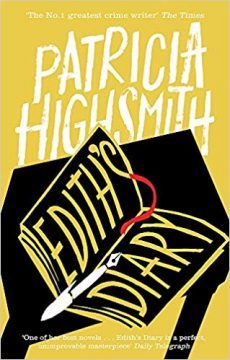by Cathy Chua
 A while ago findingtimetowrite wrote a post about underrated writers as she saw them.
A while ago findingtimetowrite wrote a post about underrated writers as she saw them.
She started off with Patricia Highsmith and I must agree, she is vastly underrated. I don’t know that it’s gender related so much as because she writes ‘crime’ which has for so long been judged as ‘genre’. Designation as denigration. Perhaps it was also her sexuality which saw her at fault in some way which affected her at a critical level. Not to mention that her books made and still make highly successful movies. I could see that being a critical negative too.
Start with the Ripley series by all means, but don’t stop there. She doesn’t just get into the minds of her characters, she will get into yours, so there will be occasion when you need to be prepared for a disturbing experience. As you read, you will find – for me in this regard Edith’s Diary stands out – that you may begin to doubt the ordinary common standards by which you have so far functioned in the world.
These are a few others on my list.
Margery Sharp Her best, and there are quite a few which stand up to that, are splendid on many levels, the quality of writing and way in which females are depicted included. She loves words and effortlessly arranges them. She is in the Austen class of writing humour that doesn’t date and that is not easy. Its inability to stay fresh is always humour’s Achilles’ heel. It is most unjust that the only book on which her reputation rests now is one about mice. Underneath the acerbic wit, her novels say things worthy of contemplation and the endings will often surprise. A small treat for some will be the colloquial expressions of the day, which frequently fell out of fashion and are now obscure. Their history is at least sometimes revealed on the internet.
You might start with Cluny Brown about a girl who wants to become a plumber but is forced into service. She is strong, independent and hilarious. The Stone of Chastity substantially predates David Lodge and such satirists of the Academic World and for my money is funnier too. For a book which lacks her customary humour, a rivetting tale of women who defy the morals of the day at great cost, but in search of their fulfillment as human beings, pick up Brittanica Mews.
MJ Hyland will always be on my top ten authors. If she ever writes another novel, it will be my great joy. The three she has given us so far are exquisite works of literature that meet her own exceedingly demanding standards. Why is she largely ignored at a critical level? I wonder if it is partly because she prefers to write in male voice. It’s what she feels comfortable doing and she does it marvellously well. Perhaps it is also because she believes in narrative and she does this with the elegance of simplicity. Hyland herself speculates that ‘None of my fiction (so far) offers redemption or relief from the hurts inflicted and this might explain why my endings are categorically unpopular (and why my books don’t sell very well).’ Read Tin Houses’s interview with her and I challenge you not to rush out and buy her books the moment you finish.
John Clanchy is a type who will continue to be hard done by, I can’t see a way out for him. His forte is short fiction, it’s probably called a long story, though it can be up to a novella. This is a form of literature which is universally looked down upon and I have absolutely no idea why. It has enough space to do things like develop character, which a short story will not whilst avoiding the padding most novels require. I began with Vincenzo’s Garden, a collection of short stories widely praised on its publication in 2005. Of topical interest one might point to the title story about van Gogh which fits in nicely with the experimental film Loving Vincent, which came out in 2017. I beg you, get hold of some Clanchy.
Olga Grushin Before she was forty she had already written not one but two consummate Russian novels. They are in English, not translated, her background being Russian. I want to go out on a small limb, whilst mortally offending the literary canon, by calling The Dreamlife of Sukhanov the best Russian novel ever written. It’s an assertion I’m happy to make despite – or due to – being a big fan of the classic Russians. That was her first and her second, The Concert Ticket, was also a quintessentially Russian affair. I don’t know why she isn’t more famous than she is.
Gerald Kersh It could be supposed one is on safe ground when quoting Anthony Burgess who said Fowler’s End was “One of the best comic novels of the century, with Sam Yudenow as superb a creation (almost) as Falstaff.” He is a great twentieth century writer, prolific and even a few years ago reissued to fanfare by the TLS. This means there is no excuse for having failed to read Kersh. And yet I know nobody who has done so other than my mother who introduced me to him many years ago.
On my review blog my saddest shelf is ‘books you won’t read before you die’. I will have to add Kersh to this shelf. All its inhabitants merit better.
